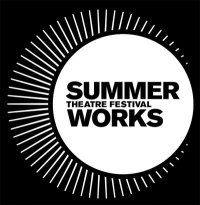SummerWorks: pillow talk

Quick – what’s more shocking: a group of attractive women wearing slips and hitting each other with pillows or a man shouting “fuck my wide ass”?
Well, if you’re a regular Plank Magazine reader and therefore likely a jaded cultural consumer, probably neither is particularly shocking but the answer is, of course, the pillow girls.
The girls in question are some of Canada’s leading playwrights and the controversy is that they have been objectified by their involvement in this:
While actor/playwright Michael Healey’s plea from the heart doesn’t raise an eyebrow.
The videos are part of a promotion strategy employed this year by the SummerWorks Festival. Obviously videos can’t represent the true experience of live performance (which, let’s face it, does not translate well to video in any event) but what they can do is evoke the aesthetic of, in this case, a festival. These videos are meant to be subversive and fun. For a festival that is about risk-taking this makes sense to me.
But why does pillow fighting seem worse than fucking Michael Healey’s wide ass? Michael Rubenfeld, Artistic Producer of SummerWorks, believes that part of it is that the transgression on display in the clip with the men is more familiar. It’s been internalized into the mainstream (and could be turned into an HBO series). The irony is that the women featured in the pillow fighting have had their looks used to promote their work (or indeed, have made use of their sexuality themselves to promote their work) but this has, seemingly, never raised any objections. But as soon as the sexualisation plays more overtly into male fantasies – or is, more correctly, ironic – the feathers fly.
If you want to get a taste of the controversy, check out the comments here.
So how effective will these clips be at promoting the Festival? Should there be more context – for example how many of the participants in either video can members of the Vancouver theatre community name on sight alone? While these are interesting questions, I think the bigger picture is about creating brand awareness for the Festival and making sure that the content promotes the brand effectively (which I would argue it does). It might not add many new patrons to the Festival this year but over time I believe this sort of marketing is hugely effective. And if more people become curious about SummerWorks, then they are also become more curious about theatre as a form.
Rubenfeld makes a neat comparison between theatre and music. The music industry is able to be accessible and still treated seriously as an art-form. The same is not true about theatre in the broader public imagination. Theatre is too often considered exclusive or rarefied or simply hardwork. And, let’s face it, a lot of work on our stages manage to be all three of those things at the same time.
I see what SummerWorks is doing as not just a way to drum up more audiences for theatre but as challenge to those of us in theatre. How is the work we create embracing the culture that is all around us, that the majority of us experience every waking day? Is our work relevant? Would it inspire debate?
Oh, and when was the last time a Canadian theatre festival devoted to new work was mentioned on the Guardian website?



